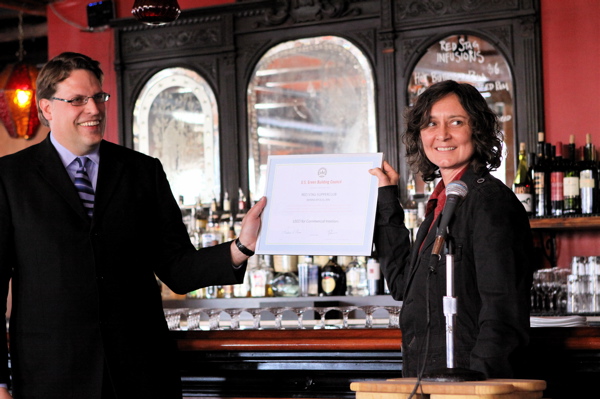
Speaking yesterday at the Leadership in Energy and Environmental Design (LEED) certification ceremony for the Red Stag Supper Club, Senator-elect Al Franken contrasted the seriousness of the certificate with the restaurant’s chic aesthetic. “A lot of people, when they think of conservation, think of Jimmy Carter in his cardigan sweater and turning your thermostat down during the winter and up during the summer,” said Franken. “They think of it as something that’s a sacrifice. As you can see how beautiful this building is, conservation’s gorgeous.”
Turning towards Red Stag restaurateur Kim Bartmann, he quipped: “Congratulations on the most delicious LEED building in Minnesota.”
The US Green Building Council (USGBC) describes LEED certification as an “independent, third-party verification that a building project is environmentally responsible, profitable and a healthy place to live and work.” Red Stag is the first restaurant in Minnesota to receive the honor and in the first ten in the country.
The event yesterday included speeches from Bartmann (also of Bryant-Lake Bowl and Barbette), as well as congratulations from Minneapolis Council Member Diane Hofstede and USGBC’s Sheri Brezinka. Rachelle Schoessler Lynn from Studio 2030, the firm that worked on Red Stag, spoke on some of the key specifics. Red Stag consumes 50 percent less energy than a typical restaurant its size and uses 70 percent less water. The additional money used for more energy efficient equipment “has already been paid back,” said Lynn. Lynn also listed four “innovation credits” that Red Stag received in addition to normal LEED-CI certification, acknowledging toxin-free housekeeping practices, a commitment to green education and composting, and the use of salvaged and reused materials in the building of dining furniture.

Franken started to close his statements: “I’m really delighted to be here, although we’re not eating.” While the crowd chuckled, he finished by saying “I want to thank you for being the first of what I hope to be many LEED restaurants in Minnesota.”
Learn more about this business in The Heavy Table’s Atlas of Ethical Eating and Drinking.

Comments are closed.